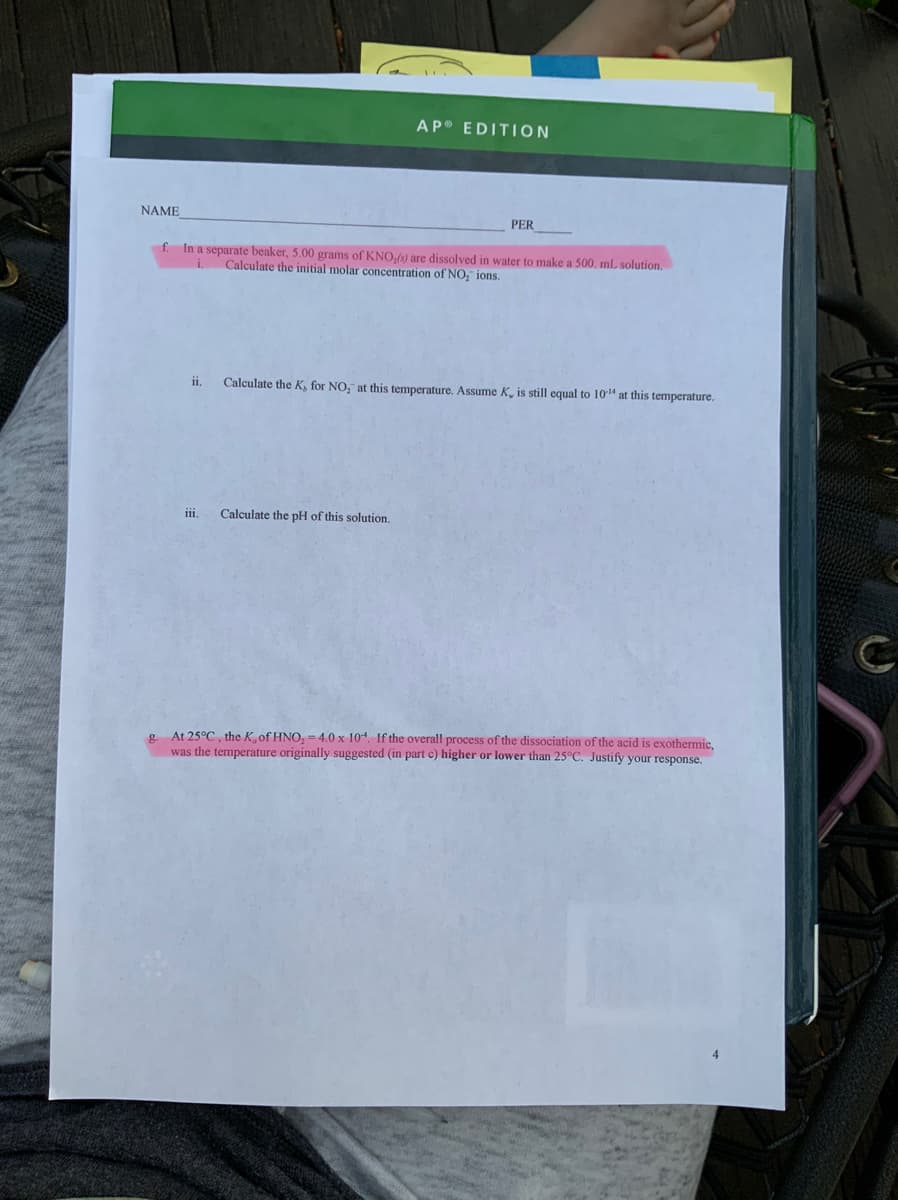c. Calculate the [H'] concentration at equilibrium at a temperature where its K, is equal to 4.5 x 10 (H)N03] [H20][HNO,] 0.0600-X x 0.0S00 %3D 4.5x10-5= x= J4.5 KI0-6X0.0500 0.0500 -x X=1,5 K10-3 2. 4.5x 10-5= 0,0500 d. Calculate the pH at equilibrium at this temperature. e. Calculate the percent dissociation of HNO, at equilibrium at this temperature. Also answer this: If ye were to dilute this solution the percent dissociation would [increase; decrease].
c. Calculate the [H'] concentration at equilibrium at a temperature where its K, is equal to 4.5 x 10 (H)N03] [H20][HNO,] 0.0600-X x 0.0S00 %3D 4.5x10-5= x= J4.5 KI0-6X0.0500 0.0500 -x X=1,5 K10-3 2. 4.5x 10-5= 0,0500 d. Calculate the pH at equilibrium at this temperature. e. Calculate the percent dissociation of HNO, at equilibrium at this temperature. Also answer this: If ye were to dilute this solution the percent dissociation would [increase; decrease].
Chemistry for Engineering Students
4th Edition
ISBN:9781337398909
Author:Lawrence S. Brown, Tom Holme
Publisher:Lawrence S. Brown, Tom Holme
Chapter12: Chemical Equilibrium
Section: Chapter Questions
Problem 12.11PAE
Related questions
Question
Can you please help me with d, e, f, and g?
![NAME
PER
2. Suppose a 0.0500M solution of HNO, was created
Write the dissociation reaction for this compound. (use correct symbols)
a.
HNO3 (aq)+H20(1)→ H(aq) + NO5 (aq)
b. Write the equilibrium expression for the acid dissociation constant, K for this acid:
(H+][NO5]
し、
(H20)(HNO,]
c. Calculate the [H'] concentration at equilibrium at a temperature where its K, is equal to 4.5 x 10s
しa
(H+][NO3]
0.0600-X X 0.DS00
[H20][HND;]
4.5 x10-5=
X= J4.5 x10-5X0.0500
0.0500 -X
4.5x 10-5=
x2
0,0500
d. Calculate the pH at equilibrium at this temperature.
Calculate the percent dissociation of HNO, at equilibrium at this temperature. Also answer this: If you
were to dilute this solution the percent dissociation would [increase; decrease].
e.
CENGAGE
Learning](/v2/_next/image?url=https%3A%2F%2Fcontent.bartleby.com%2Fqna-images%2Fquestion%2F310fa1be-a638-47b3-9316-1b971054d314%2F8407c9fa-5979-4131-894e-b79c7af7e51d%2Fm88mzkq_processed.jpeg&w=3840&q=75)
Transcribed Image Text:NAME
PER
2. Suppose a 0.0500M solution of HNO, was created
Write the dissociation reaction for this compound. (use correct symbols)
a.
HNO3 (aq)+H20(1)→ H(aq) + NO5 (aq)
b. Write the equilibrium expression for the acid dissociation constant, K for this acid:
(H+][NO5]
し、
(H20)(HNO,]
c. Calculate the [H'] concentration at equilibrium at a temperature where its K, is equal to 4.5 x 10s
しa
(H+][NO3]
0.0600-X X 0.DS00
[H20][HND;]
4.5 x10-5=
X= J4.5 x10-5X0.0500
0.0500 -X
4.5x 10-5=
x2
0,0500
d. Calculate the pH at equilibrium at this temperature.
Calculate the percent dissociation of HNO, at equilibrium at this temperature. Also answer this: If you
were to dilute this solution the percent dissociation would [increase; decrease].
e.
CENGAGE
Learning

Transcribed Image Text:AP® EDITON
NAME
PER
f. In a separate beaker, 5.00 grams of KNO,(1) are dissolved in water to make a 500, mL solution.
Calculate the initial molar concentration of NO, ions.
ii.
Calculate the K, for NO, at this temperature. Assume K, is still equal to 1014 at this temperature.
ii.
Calculate the pH of this solution.
At 25°C, the K of HNO, = 4.0 x 104. If the overall process of the dissociation of the acid is exothermic,
was the temperature originally suggested (in part c) higher or lower than 25°C. Justify your response.
Expert Solution
This question has been solved!
Explore an expertly crafted, step-by-step solution for a thorough understanding of key concepts.
Step by step
Solved in 6 steps

Knowledge Booster
Learn more about
Need a deep-dive on the concept behind this application? Look no further. Learn more about this topic, chemistry and related others by exploring similar questions and additional content below.Recommended textbooks for you

Chemistry for Engineering Students
Chemistry
ISBN:
9781337398909
Author:
Lawrence S. Brown, Tom Holme
Publisher:
Cengage Learning

Chemistry & Chemical Reactivity
Chemistry
ISBN:
9781133949640
Author:
John C. Kotz, Paul M. Treichel, John Townsend, David Treichel
Publisher:
Cengage Learning

Chemistry & Chemical Reactivity
Chemistry
ISBN:
9781337399074
Author:
John C. Kotz, Paul M. Treichel, John Townsend, David Treichel
Publisher:
Cengage Learning

Chemistry for Engineering Students
Chemistry
ISBN:
9781337398909
Author:
Lawrence S. Brown, Tom Holme
Publisher:
Cengage Learning

Chemistry & Chemical Reactivity
Chemistry
ISBN:
9781133949640
Author:
John C. Kotz, Paul M. Treichel, John Townsend, David Treichel
Publisher:
Cengage Learning

Chemistry & Chemical Reactivity
Chemistry
ISBN:
9781337399074
Author:
John C. Kotz, Paul M. Treichel, John Townsend, David Treichel
Publisher:
Cengage Learning

Introductory Chemistry: A Foundation
Chemistry
ISBN:
9781337399425
Author:
Steven S. Zumdahl, Donald J. DeCoste
Publisher:
Cengage Learning

Chemistry
Chemistry
ISBN:
9781305957404
Author:
Steven S. Zumdahl, Susan A. Zumdahl, Donald J. DeCoste
Publisher:
Cengage Learning

Chemistry: An Atoms First Approach
Chemistry
ISBN:
9781305079243
Author:
Steven S. Zumdahl, Susan A. Zumdahl
Publisher:
Cengage Learning